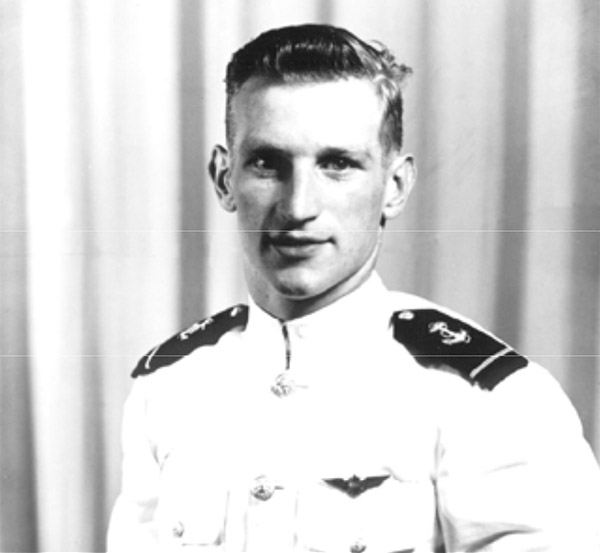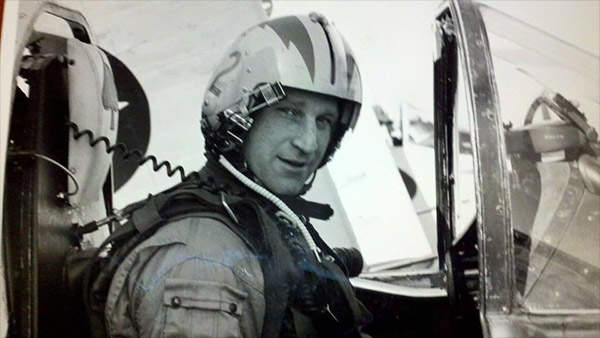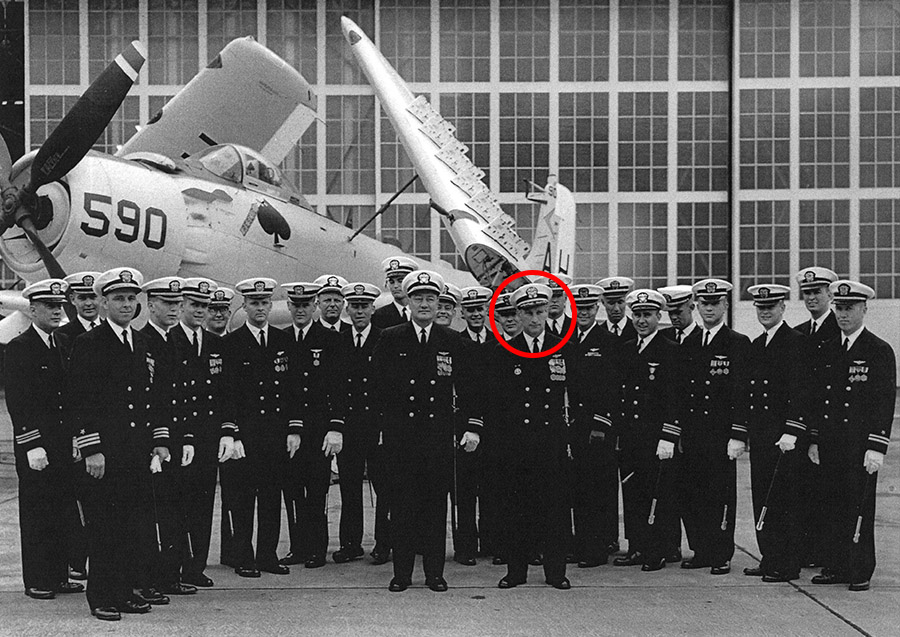From time to time Gresh and I have written about a few of the great people we worked with over the years. For me, Gordon Smith is at the top of the list. Gordon was the real deal: Movie star good looks, charisma, Ivy League credentials, war hero, successful senior executive, successful entrepreneur, and a man who deeply understood what leadership is all about. I worked for Gordon in the early ’90s, lost track of him for a couple of decades, had dinner with him about 3 years ago, and learned of his passing about a year and a half ago. Gordon had 92 years on this planet so I guess he got his money’s worth, but knowing he is gone makes the world seem a lot emptier. He was a little frail when we last met, but he still had his razor sharp mind, his Boston accent, his full head of hair, and his amazing wit and gracious charm.

Gordon Smith was a naval aviator (a carrier pilot and commander) who flew 244 combat missions in Korea and Vietnam. He’d been shot down, he’d been run over by an aircraft carrier after a failed catapult launch (keel hauled, he called it), he’d been decorated for valor numerous times, he was one of the top people in Naval Intelligence, and the list goes on. I can’t do his Navy career justice here, but I strongly suggest you take 5 minutes and read the tribute one of his fellow admirals wrote. I’ll give you a couple of links at the end this blog. Trust me on this: Gordon Smith was one hell of a man and a true leader.

How I met Gordon is an interesting story. I had been laid off at Aerojet Ordnance and I took a lower level job at Sargent-Fletcher, another So Cal aerospace company. Sargent-Fletcher was a nice company but I wasn’t happy with the culture there and after six months, another offer floated in for a VP-level job in Orlando (it came about as a result of my earlier job search). So off I went to make my mark in Florida building military lasers, where I loved the work but hated the area. Central Florida, to me, was heat, humidity, and cockroaches so big they fought you for the covers at night (the Floridians call them palmetto bugs, but you can’t fool me; those things were cockroaches). I knew I had to get back to southern California. I don’t mean to insult anyone with my comments about Florida, but it is what it is. You’re young; you’ll get over it. Mea culpa.
The call came in from Sargent-Fletcher early one Friday morning after I’d been in Orlando for six months. They hired a new president (that would be Gordon Smith), he heard about my brief pre-Orlando stint at Fletcher, and he wanted to meet me. On Saturday, the next day. It was a redeye flight, I forgot to bring my dress shoes, and the next morning I was in Gordon’s office in a suit and tie and my running sneakers. We had a good interview and he asked me what I wanted. I gave my Miss America answer: A meaningful position, a chance to make a contribution on a winning team, you know, the standard Miss America “I like long walks on the beach and I want to work for world peace” bullshit interview response.
Gordon smiled. “I mean money,” he said, rubbing the fingers of his hand like he was counting cash. “How much do you need?”

Hmmm. I guess I should have thought about that earlier, but truth be told, I had not. I gave an obscenely high answer, which I regretted even before I finished saying it. I was desperate to get back to southern California, and I just blew it, I thought, by being greedy.
Gordon smiled. “The number I had in mind was…” and then he offered $2K more than what I had said. I kind of locked up mentally. Let’s see, I thought, he asked how much I wanted. I said X. He came back with X plus $2K. I had studied negotiation tactics. It wasn’t supposed to work that way. I didn’t know what to say. Gordon smiled. He knew.
You should never accept a job offer immediately, but what could I say?
“I’m your boy.”
“What are you doing for dinner?” Gordon asked. My mind was still thinking about what had just happened. I had a flight back to Orlando the next day. I told Gordon we hadn’t made any plans, and he said, “Good, come to my restaurant for dinner.”
“Sure,” I said. “You already have a favorite restaurant here in So Cal?” I knew he had just become the president at Sargent-Fletcher.
“I own a restaurant here,” Gordon answered.
“You own a restaurant?” Sometimes, I can be incredibly smooth.
Gordon’s restaurant was the Nieuport 17, and it wasn’t just a restaurant. It was one of the swankiest dining experiences in the world. It had (as the name implied) an aviation motif. When Sue and I pulled up and gave our keys to the valet, a tall, elegant man in an exquitely-tailored suit approached. “You must be Joe, and you must be Sue. I’ve heard so much about you.” It was Wilbur, Gordon’s Nieuport 17 partner and co-owner. Wilbur escorted us in to the lobby, which was decorated with photos of famous aviators and astronauts. Gordon’s picture hung on that wall. Wilbur saw me eyeing the photos. My gaze fixed on one autographed by Neil Armstrong. Yes, that Neil Armstrong, the first man on the moon. “Neil is usually here,” Wilbur said. “If he’s in tonight, I’ll introduce you.”
Gordon joined us and asked if we’d like a tour of the restaurant. It was awesome. All the wait staff were dressed in some sort of pseudo-Navy nautical uniform. The chefs and their helpers damn near snapped to attention when we entered the kitchen. It was “Good evening, Admiral,” and “How are you this evening, Admiral?” all around. All hands were on deck.
When we (we being me, Sue, and Gordon) sat down for dinner, Wilbur came over and asked if he could join us. “I haven’t had dinner yet,” he explained. Sure, no problem. Wilbur asked what we liked best from our prior visits, and I explained it was our first time in the Nieuport 17. Wilbur showed some surprise, and then he held his arm up and snapped his fingers. Suddenly, there were at least eight waiters and waitresses at our table. “Bring Sue and Joe a sampler of everything on the menu,” Wilbur ordered, and the wait staff went to battle stations following those orders. We weren’t hungry after sampling literally every main course, but hey, I couldn’t be impolite. We both went with the chicken with Morel mushrooms. It was heavenly.
I spent four years at Sargent-Fletcher, and on every one of those days I couldn’t wait to get to work in the morning and I always stayed late in the evening. I hired on as the QA director, and then one morning Gordon called me to his office to tell me he had just fired the engineering director. “Wow, that’s a bold move,” I said. “Who’s going to run Engineering?” Gordon looked at me and smiled. I knew. I had a new job. “Okay,” I said, “but who’s going to take over Quality?” Gordon continued to look at me and smile without speaking. Okay, so I’d be wearing two hats for a while. A year or so later, I had another call to come to Gordon’s office, and he told me he had just fired the Operations director. “Wow,” I said. “Who’s going to run the plant?” Another Gordon smile, and now I was wearing three hats. I loved that job, we had the plant back on schedule in short order, and Gordon kept showering me with raises. His idea was to pay people more than they thought they were worth. It worked. But that wasn’t the best part. Gordon would tell me what he felt the company needed; he never told me how to go about making it happen. He knew how to lead. Find the right people, pay them more than they think they want, then get out of their way. It was awesome.
Here’s the link about Gordon’s career I mentioned earlier. If you would like to read about Gordon’s decorations for valor (including the Silver Star), those are here. Rest in peace, Admiral Smith. You earned it.
Never miss an ExNotes blog. Sign up here for free:


Dang! You had me with the A-1 in the picture, this guy was the real deal. Now have look at the links!
Thanks for commenting, Terry.
Great blog, great tribute, and a great man. Wonderful read, Joe, and should be required reading in every management/leadership class ever held…
Thanks, Greg.
Joe, Thanks for the great tribute to Gordo. He was one of the best bosses I ever worked for; he was everything you said and a lot more.
We were lucky to have the opportunity. Thanks for commenting, Peter.
Gordon was the fire arm, you were the bullet!
If both both are in alignment, you’ll always win!
I had a lot of fun working for Gordon. Probably the best job I ever had.
Your defense industry stories are the best thing on ExNotes.
“I’m your boy.”
Thanks, Joe.
It seems that we’ve just discovered one of the reasons why the world is so dysfunctional – not enough Gordon Smiths in it. Pity that modern CEOs aren’t familiar with the concept of treating their employees with Mr Smith’s level of trust and appreciation. If they did, I’m pretty sure our society would be an order of magnitude higher in financial equity and social civility than it is today, where our largest employers are also the ones with the greatest number of their employees on food stamps and Medicaid. Pay your employees more than they think that they’re worth? What a concept. If they ever perfect human cloning, they need to start with people like Gordon Smith.
The world we be a better place if we were able to hang on to just one. But I agree, we need more people like him. Thanks for commenting.